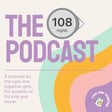
Episode 71- Fearing Insulin on Board, Dosing for Pizza and Donuts, and a Special Surprise
Sometimes we just want our kids to have a dang donut. But why does this food have to be so hard to dose for? Is it even worth the hassle? Raquel and Amanda think so. They go through how they uniquely dose for challenging high fat foods (like pizza and donuts), discuss insulin on board and how they use that information to make diabetes dosing decisions, and chat what it's like living ALONE with type 1 diabetes. As parents of type 1 kids, we want all the information so we can be as informed as possible and attempt to give our children as normal a life as possible. Join the Type One Together girls for their takes on all these topics and more...PLUS a little life update for one of them :)
AD: Sweet Dreams is an iPhone app that makes it effortless to monitor your (or a loved one's) blood glucose level. It does so by displaying the reading in various designs on your iPhone's Lock Screen, your Apple Watch, CarPlay and your other Apple devices. With a polished design and customizable interface, the app makes diabetes management more playful!
Sweet Dreams: https://apps.apple.com/us/app/sugar-tracker-diabetes/id1644428422
Babysitters: https://www.typeonetogether.com/t1dbabysitting
Team Together: https://www.typeonetogether.com/teamtogether
T1D Diagnosis: Made Simple: https://www.typeonetogether.com/madesimple
Omnipod 5 Auto Mode Masterclass: https://stan.store/typeonetogether/p/auto-mode-masterclass
Tandem Control IQ Deep Dive: https://www.typeonetogether.com/tandem
Travel Masterclass: https://stan.store/typeonetogether/p/t1d-travel-masterclass
Navigating Nutrition Masterclass: https://stan.store/typeonetogether/p/-9m6nt
Masterclass Hub (Sick Day, T1D & School, Celiac) Coming Soon!: https://www.typeonetogether.com/copy-of-courses
Better Together Group Coaching: https://docs.google.com/forms/d/e/1FAIpQLSdOPsdNQGTBCBcx8IpFMwrTekVI0MsO1SLdcYurj1c1VtbL4A/viewform
T1D Grandparents Course: https://stan.store/typeonetogether/p/t1d-grandparents-course-
Super Parents Community on the Honey Health App: https://honeyhealth.app.link/28gQmJjyDsG
Products: https://www.typeonetogether.com/shop
Free Resources: https://stan.store/typeonetogether
Instagram: https://www.instagram.com/typeonetogether/
Tiktok: https://www.tiktok.com/@typeonetogether
Website: www.typeonetogether.com
Amazon Storefront: https://amzn.to/3VaKSD0
Facebook Group: https://www.facebook.com/groups/typeonetog




